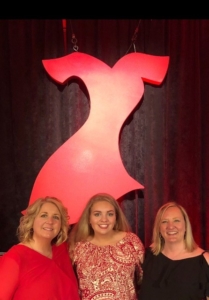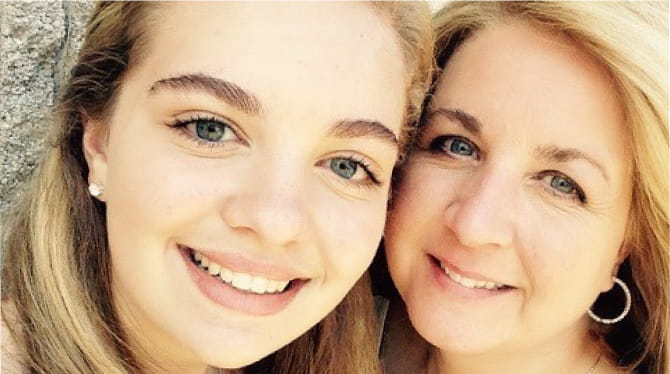 |
| www.strokecamp.org |
 |
| http://www.unitedstrokealliance.org/ |
a resource for Stroke Support Groups called The Booster Box. Included in the box is everything a leader needs to conduct a support group meeting for up to 24 attendees.
To receive your free Booster Box please call our office at
309-688-5450 or email info@strokecamp.org to request yours.
Subscriptions will be available for purchase and information will be inside your free box.
 |
| Show Me The Booster Box |
*****************************************************************
Luckily, her daughter was home -- and remembered what her science teacher said a few days before
By American Heart Association News
Days after learning about stroke at school, Katie Murphy recognized her mother's symptoms and got help. Katie (left) with mother Christa Murphy. (Photos courtesy of Christa Murphy)
Christa Murphy was in the bathroom getting ready for work, yet the routine wasn’t going like it should.
She kept dropping the soap in the shower. She squeezed globs of toothpaste out of the tube, seemingly everywhere but onto the bristles of her brush.
“I started to feel really strange,” she said. “But I didn’t feel sick. I didn’t have a headache.”
With her husband out of town and her son away at college, the only other person home was her daughter, Katie, an eighth-grader. Katie wasn’t even supposed to have been home that Saturday morning; she was only there because a sleepover the night before got cancelled.
Katie was in bed, watching Netflix on her phone, when Christa went into the teen’s room and asked for help.
What Katie heard was gibberish.
“What’s wrong with you?” Katie said.
As Christa struggled to give a coherent answer, Katie remembered a lesson from her science class just two days before. Teacher Beth Tomlin told the students that when a friend of hers had a stroke, her words were jumbled.
Katie immediately called her dad, but he didn’t answer. So she called her grandmother, Christa’s mom. She told Katie to take a deep breath and call 911.
Christa Murphy was in the bathroom getting ready for work, yet the routine wasn’t going like it should.
She kept dropping the soap in the shower. She squeezed globs of toothpaste out of the tube, seemingly everywhere but onto the bristles of her brush.
“I started to feel really strange,” she said. “But I didn’t feel sick. I didn’t have a headache.”
With her husband out of town and her son away at college, the only other person home was her daughter, Katie, an eighth-grader. Katie wasn’t even supposed to have been home that Saturday morning; she was only there because a sleepover the night before got cancelled.
Katie was in bed, watching Netflix on her phone, when Christa went into the teen’s room and asked for help.
What Katie heard was gibberish.
“What’s wrong with you?” Katie said.
As Christa struggled to give a coherent answer, Katie remembered a lesson from her science class just two days before. Teacher Beth Tomlin told the students that when a friend of hers had a stroke, her words were jumbled.
Katie immediately called her dad, but he didn’t answer. So she called her grandmother, Christa’s mom. She told Katie to take a deep breath and call 911.
 |
Christa and Katie Murphy
with Beth Tomlin,
|
As Katie suspected, Christa was suffering a stroke – a blood vessel in her brain had become blocked. Thanks to Katie’s quick response, Christa got to the hospital in time to receive clot-busting medicine. In most cases, the medicine must be administered within three hours of the stroke’s onset; the sooner it’s delivered, the better the chances of recovery.
For Christa, the delivery came soon enough.
“It was like a switch was flipped,” she said. “Suddenly I was able to talk, my mind cleared up, and I knew I was going to survive.”
Christa was in the hospital for three days and underwent a series of tests. More than a year later, doctors still don’t know why she had the stroke. This happens in about 30 percent of all ischemic strokes; it’s classified as cryptogenic.
Christa – who lives in Menomonee Falls, Wisconsin, a suburb of Milwaukee – had no other warning signs. She has no family history, aside from a grandmother who died of a stroke at age 94.
Christa was 45. While in relatively good health, she faced plenty of stress as a mother, daughter and wife. She also worked two jobs.
Now, she’s more health conscious, eating better and regularly walking the family dog – a new addition since her recovery.
She also was recently an honoree at the American Heart Association’s Go Red for Women luncheon in Milwaukee.
Not only did she tell her story to about 400 attendees, she also watched for the first time a video in which she, Katie and Tomlin recounted the morning everything had to go right to save her life.
“The bond between the three of us will last a lifetime,” Christa said.
Stories From the Heart chronicles the inspiring journeys of heart disease and stroke survivors, caregivers and advocates.
-------------------------------------------------------------------------------------------
American Heart Association News covers heart disease, stroke and related health issues. Not all views expressed in American Heart Association News stories reflect the official position of the American Heart Association.
Copyright is owned or held by the American Heart Association, Inc., and all rights are reserved. Permission is granted, at no cost and without need for further request, to link to, quote, excerpt or reprint from these stories in any medium as long as no text is altered and proper attribution is made to the American Heart Association News. See full terms of use.
HEALTH CARE DISCLAIMER: This site and its services do not constitute the practice of medical advice, diagnosis or treatment. Always talk to your health care provider for diagnosis and treatment, including your specific medical needs. If you have or suspect that you have a medical problem or condition, please contact a qualified health care professional immediately. If you are in the United States and experiencing a medical emergency, call 911 or call for emergency medical help immediately.
For Christa, the delivery came soon enough.
“It was like a switch was flipped,” she said. “Suddenly I was able to talk, my mind cleared up, and I knew I was going to survive.”
Christa was in the hospital for three days and underwent a series of tests. More than a year later, doctors still don’t know why she had the stroke. This happens in about 30 percent of all ischemic strokes; it’s classified as cryptogenic.
Christa – who lives in Menomonee Falls, Wisconsin, a suburb of Milwaukee – had no other warning signs. She has no family history, aside from a grandmother who died of a stroke at age 94.
Christa was 45. While in relatively good health, she faced plenty of stress as a mother, daughter and wife. She also worked two jobs.
Now, she’s more health conscious, eating better and regularly walking the family dog – a new addition since her recovery.
She also was recently an honoree at the American Heart Association’s Go Red for Women luncheon in Milwaukee.
Not only did she tell her story to about 400 attendees, she also watched for the first time a video in which she, Katie and Tomlin recounted the morning everything had to go right to save her life.
“The bond between the three of us will last a lifetime,” Christa said.
Stories From the Heart chronicles the inspiring journeys of heart disease and stroke survivors, caregivers and advocates.
-------------------------------------------------------------------------------------------
American Heart Association News Stories
American Heart Association News covers heart disease, stroke and related health issues. Not all views expressed in American Heart Association News stories reflect the official position of the American Heart Association.
Copyright is owned or held by the American Heart Association, Inc., and all rights are reserved. Permission is granted, at no cost and without need for further request, to link to, quote, excerpt or reprint from these stories in any medium as long as no text is altered and proper attribution is made to the American Heart Association News. See full terms of use.
HEALTH CARE DISCLAIMER: This site and its services do not constitute the practice of medical advice, diagnosis or treatment. Always talk to your health care provider for diagnosis and treatment, including your specific medical needs. If you have or suspect that you have a medical problem or condition, please contact a qualified health care professional immediately. If you are in the United States and experiencing a medical emergency, call 911 or call for emergency medical help immediately.


No comments:
Post a Comment
We would like to hear what you think of our articles and welcome your input. For your safety, all comments will be reviewed by the moderator before being posted. Please know that comments containing links to other sites or email addresses have typically been spam, so, and I apologize, comments containing those will be monitored closely and may not be accepted.